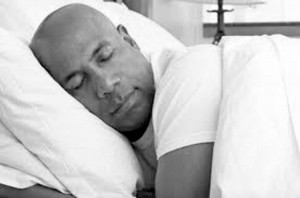Blacks’ sleeping patterns are unhealthy, Harvard study finds
3rd February 2014 · 0 Comments
By Frederick H. Lowe
Contributing Writer
Lack of slumber may contribute to chronic diseases – diabetes and high blood pressure
(Special to the Trice Edney News Wire from TheNorthStarNews.com) — Perceived or objective job discrimination, limited control over work demands and a determination to succeed against all odds increase Black workers’ stress, causing them to lose hours of restorative sleep compared to their white coworkers, according to a study by the Harvard School for Public Health.
The problem, however, does not end there. The lack of sleep leads to chronic ailments, including high-blood pressure, obesity, diabetes, heart disease, diseases that are prevalent in the African-American community. Lack of sleep also can lead to death.
The study titled, “Racial Disparities in Short Sleep by Occupation and Industry,” analyzed eight years of data from the National Health Interview Survey, which polled 137,000 adults from 2004-2011. In its investigation, Harvard School of Public Health compared sleep patterns between Black and whites in eight industry categories.
Some of the categories are: finance information/real estate, professional/administrative management, educational services, public administration and other services, health care/social assistance, manufacturing and construction, public administration/ arts/ and other services.
Black and white sleep patterns
The study is one of the few that compares Black and white sleep patterns.
“Blacks were more likely to report short-sleep duration than whites, and the Black disparity was widest among those who held professional occupations,” the report stated. More than one-third of Blacks sleep less than seven hours per night. The study found that 37 percent of Black respondents were “short sleepers,” or individuals who sleep less than seven hours per night, compared to only 28 percent of whites who slept fewer than seven hours per night.
Optimal sleep is seven hours per night, which is associated with the lowest levels of morbidity, poor health, and mortality or death. Long sleep is considered more than seven hours per night.
Lack of sleep is a growing health concern
The 10-page report, published in the June 13, 2013, edition of the American Journal of Epidemiology, noted that lack of sleep is a growing public-health concern because it has been linked to increased weight gain, obesity, diabetes, coronary heart disease and mortality.
Harvard School of Public Health reported that in all industries combined, African Americans working in professional or management positions were more likely to experience short sleep than their white counterparts. Some 42 percent of Blacks experienced short sleep, compared to 26 percent of white workers, the study found.
“With increasing numbers of Blacks entering professional and management roles in numerous industries, it is important to investigate and address the social factors contributing to short sleep disparities in Blacks, compared with whites in general, and particularly in professional settings,” said the study’s lead author Chandra Jackson, a postdoctoral research fellow in the Department of Nutrition at the Harvard School of Public Health.
African-Americans often are under intense-job scrutiny from their white colleagues. In addition, Blacks are not connected to social networks that assist their white coworkers on the job.
Black men and Black women often are isolated on the job because some of their white coworkers don’t speak to them and in some cases, they mutter racial slurs and make nasty comments about President Barack Obama.
Yet at the same time, African Americans are very fearful of losing their jobs.
Blacks who worked in support services also were more likely to experience short sleep than whites, 37 percent for Blacks, compared to 26 percent for whites.
Blacks who worked as laborers also experienced short sleep, compared to their white coworkers. Some 35 percent of Black laborers experienced short sleep, compared to 32 percent of white workers.
The retail and the food industries were the only industries where Blacks and white had similar rates of short sleep.
Cell phones and the Internet contribute to lack of sleep
The study notes that the Internet, cell phones and other communications devices also may contribute to short sleep.
“The Internet and mail capabilities, cellular phones and other communications devices have resulted in employees becoming perpetually available and capable of communicating and engaging in work in ways and during times that may displace sleep,” the report said.
The study also noted that Blacks are more likely to work nontraditional shifts and nonstandard work schedules, which disrupt circadian rhythms, increasing their appetite for sweet and salty foods. In addition, African Americans may work multiple low-wage jobs and still live in poverty, leading to short sleep.
This article originally published in the February 3, 2014 print edition of The Louisiana Weekly newspaper.



